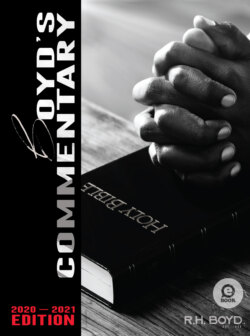Читать книгу Boyd's Commentary - R.H. Boyd Publishing Corporation - Страница 12
На сайте Литреса книга снята с продажи.
INTRODUCTION
ОглавлениеThe family is made up of loved ones who know us best, in front of whom our vulnerability is on full display. In this divine institution we are introduced to love for the first time, either by the demonstration of it or by the longing for it in its absence. The family is also where love is tragically tested. Whether by grief, betrayal, unfaithfulness, neglect, and more, the strength of a family’s love is measured by its ability to navigate the uncertain waters these inevitable life experiences cause. Family dysfunction is unfortunately the evidence of love failing to do so. But failed love doesn’t mean lost love. At the least, failed love implies an attempt to love was made, and there’s hope in that. Lost love, on the other hand, is when love has been buried beneath the layers of pain until the flame of its true expression has been totally deprived of much needed oxygen. Like fertilizer, the decomposition of dying love feeds the root of hate in the wake of its eventual and inevitable demise. A scar flourishes in its place, reminiscent of where love once was and is no more.
Sounds depressing, I know, but its unfortunately indicative of the drama played out in the ancient family of the patriarchs of Israel. As the last of the three great patriarchs, Jacob, whose name was changed by God to Israel, was both a victim and perpetrator of lost love in the family. As the youngest son of Isaac and Rebekah, Jacob was favored by his mother, while Isaac his father favored his older brother Esau. This favoritism played out with tragic results. Rebekah and Jacob conspired to manipulate Isaac into giving Jacob the birthright blessing intended for Esau because he was the firstborn. Because of this, Esau hated his brother and vowed to kill him upon the death of their father (Gen. 27:41).
As if inherited by the next generation, hatred in the family again revealed its ugly head among Jacob and his twelve sons. Similar to the favoritism that plagued his family of origin, Jacob favored his second youngest son, Joseph, more than the rest of his sons. Jacob’s older sons hated Joseph like his brother Esau hated him, and their hatred for him resulted in tragedy.
Known by many scholars as Joseph’s narrative or Joseph’s Novella, Genesis 37 opens with a brief introduction of Joseph as a young man. At the time of the lesson, he was seventeen years old and enjoying the life of entitlement and privilege. But that would soon change.
